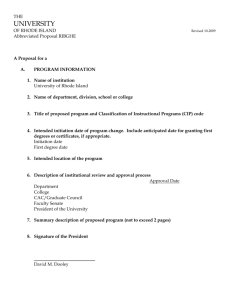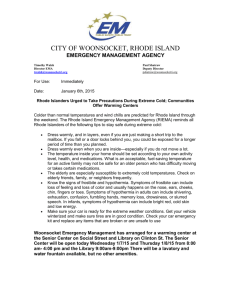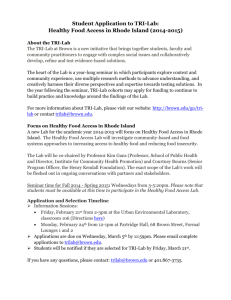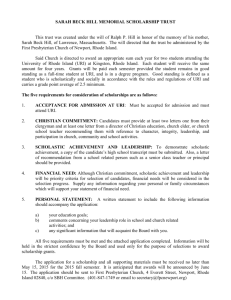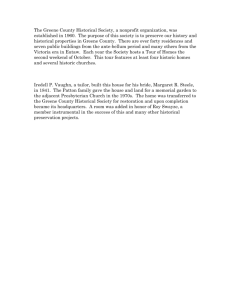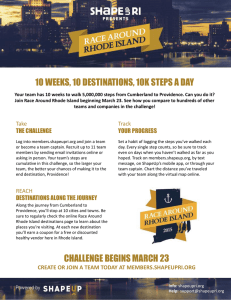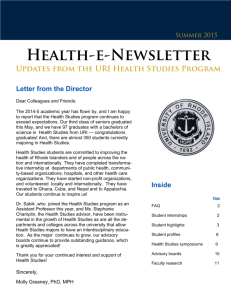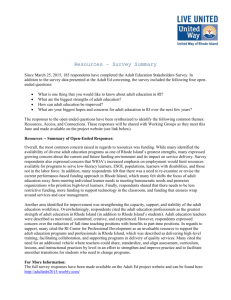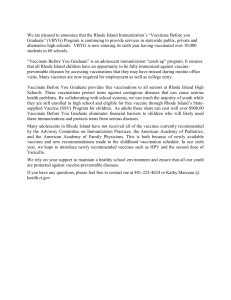Health-e-Newsletter - University of Rhode Island
advertisement
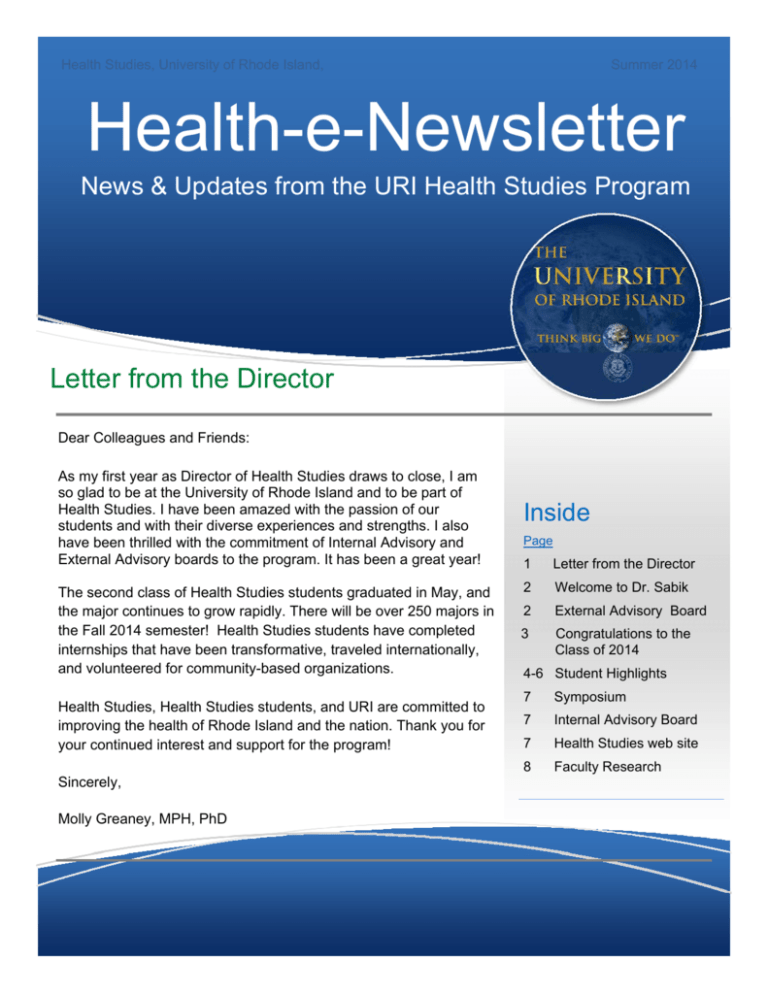
Health Studies, University of Rhode Island, Summer 2014 Health-e-Newsletter News & Updates from the URI Health Studies Program Letter from the Director Dear Colleagues and Friends: As my first year as Director of Health Studies draws to close, I am so glad to be at the University of Rhode Island and to be part of Health Studies. I have been amazed with the passion of our students and with their diverse experiences and strengths. I also have been thrilled with the commitment of Internal Advisory and External Advisory boards to the program. It has been a great year! The second class of Health Studies students graduated in May, and the major continues to grow rapidly. There will be over 250 majors in the Fall 2014 semester! Health Studies students have completed internships that have been transformative, traveled internationally, and volunteered for community-based organizations. Health Studies, Health Studies students, and URI are committed to improving the health of Rhode Island and the nation. Thank you for your continued interest and support for the program! Sincerely, Molly Greaney, MPH, PhD Inside Page 1 Letter from the Director 2 Welcome to Dr. Sabik 2 External Advisory Board 3 Congratulations to the Class of 2014 4-6 Student Highlights 7 Symposium 7 Internal Advisory Board 7 Health Studies web site 8 Faculty Research Health Studies, University of Rhode Island Summer 2014 Welcome to Dr. Sabik We are pleased to welcome Dr. Natalie Sabik to Health Studies and URI as an assistant professor. She has a doctorate in Psychology and Women’s Studies from the University of Michigan. Additionally, she has a MS in psychology and a MA in Women's Studies from George Washington University. Dr. Sabik’s research is interdisciplinary in nature and is focused on body image and health for diverse women. At URI, Natalie will continue to further her research on body image and health by studying how body image affects stress, health behaviors, and mental health among aging adults. She also will teach core Health Studies classes and advise and mentor students. Welcome, Dr. Sabik! External Advisory Board Richard Esposito, RI Department of Behavioral Healthcare, Developmental Disabilities and Hospitals Candice Fioravanti, Provant Health Solutions JoAnna Hillman, Centers for Disease Control & Prevention, Public Health Informatics A heartfelt thank you to member of our External Advisory Board. We appreciate your passion, knowledge, and effort on behalf Health Studies! . Robert Marshall, RI Department of Health (retired) Ana Novais, RI Department of Health Edward Quinlan, Hospital Association of RI (retired) Kurt2Rix, The Wellness Company Health Studies, University of Rhode Island Summer 2014 Congratulations Class of 2014! Continuing education Alexandra Cole (Stonington, CT) will enroll in the masters in Healthcare Administration program at the University of Missouri, Columbia, MO. Adriana Ferreira (Lincoln, RI) will be attending the New England School of Optometry in Boston, MA. 3 Health Studies, University of Rhode Island Summer 2014 Student Spotlight: Starting a Non-profit 3. What is next for On Guard? Bryanna Mellen, Class of 2015 Hometown: Northbridge, MA We are planning a Family Fun Day for COs and their Families for the end of the summer. Additionally, I will be an invited speaker at the National Correction Officer Medal of Honor Conference in Nashville, TN in November! I will be giving a 15 minute presentation to over 500 COs and Department of Corrections employees from across the US. 4. What are your thoughts on Health Studies? Declaring Health Studies as my major was probably one of the best decisions I could have made for my career. The classes were very interesting. I really loved how you can declare a minor or a double major. Being able to declare a Psychology major allowed me to engage in classes that I was really interested in and that I could also apply to my Health Studies classes. 1. What is the nonprofit you started? I founded the On Guard Initiative with my best friend, Julie Broderick (Worcester State University) in 2012 to raise awareness about the importance of mental health and suicide prevention among correction officers (COs). My father was a CO for 22 years and he committed suicide at the age of 46. After his death, I discovered that COs are 39% more likely that any other occupation to commit suicide. The average life expectancy for a CO is only 57 years.1 This realization was the impetus for founding the On Guard Initiative. Our goal is to raise awareness about the importance of mental health and suicide prevention among COs. 6. What advice would you give to students considering majoring in Health Studies? If you are considering being in the health field, I think Health Studies is an ideal path to take. It gives you the freedom to choose classes that you’re truly interested in, also while giving you skills that will help you in your career. It is an extremely practical and comprehensive major that will teach you skills that will benefit you in whatever you choose to do in the future. 2. How are you working toward your goal? http://www.onguardinitiative.org We have had two 5k road races raising around $17,000. We will use these funds to establish support groups for COs and their families. Funds raised will also go towards providing a child of a CO with a $1,000 college scholarship. 1 Desert Waters - Depression, PTSD, and Comorbidity in United States Corrections Professionals, 2013. 4 Health Studies, University of Rhode Island Summer 2014 Student Spotlight: Internship Experiences Lynly JeanLouis, Class of 2014 Providence, RI 3. How do your internship and classroom experiences complement one another? My classroom experience went hand-in-hand with my internship activities. I felt well prepared with the necessary skills needed to complete various projects and healthcare initiatives within my department. 4. What advice would you give another student who is thinking about doing an internship? Make the most of your internship! Ask questions and don’t be afraid to put yourself in an uncomfortable situation. I made sure to try to accompany my director to as many meetings as possible as well as participate in all our department events. 1. Where and with whom did you do your internship? 5. What are your thoughts on Health Studies? I completed my internship as a Corporate Social Responsibility and Community Investment intern within the Community Relations Department. Carolyn Belisle, Managing Director of Community Relations, was my supervisor. Anyone interested in the non-clinical side of healthcare, Health Studies is the major for you. You will leave URI with a well-rounded education that touches upon all aspects of the healthcare industry. I love the diverse course list that students are able to choose from within their concentrations. This independence allows students to structure their education in a way that appeals to their interest and prepares them for the real world. 2. What did you like best about your internship experience? I loved that my internship provided me with the opportunity to work with various health care organizations in Rhode Island giving me excellent real world experience. I absolutely loved majoring in Health Studies. The course work is exciting and relevant to what you will experience in the work force! 5 Health Studies, University of Rhode Island Summer 2014 Student Spotlight: Research Experiences Duncan Stiller, Class of 2014 Seattle WA 1. What was your research project and with whom did you work? Dr. Kathleen Gorman (Psychology) was my mentor. My project had three components. First, I completed an extensive literature review to gain an understanding of malnutrition in the developing world. Next, I completed a practical learning experience during which I went the Edesia, a non-profit organization in Providence, RI that produces a variety of products to combat malnutrition, specifically in children. I visited the factory and interviewed their director of operations to learn more about what they do. 2. What did you gain from this experience? This project was perfect for my major. Since Health Studies is interdisciplinary, I knew that I needed to step outside of my familiar area of knowledge and do something new, but related. What I found is that malnutrition is completely entangled with public health in developing countries, especially infectious disease. This project served as the perfect capstone to my degree. The final portion of my project was the synthesis of everything I have done up to this point. I took the information from my literature review, factory tour/interview, and conversations with my advisor, and tried to figure out why so many children are starving. Obviously, that is a very challenging question to answer, but what I found is that it is NOT a lack of food. We [the entire world] produce enough food for about 12 billion people, which is close to twice the world's population. The problem is that of access and distribution. This problem is affected by politics, climate (and climate change), poverty, and simple geography. 3. What advice would you give to other Health Studies students? My advice is to: 1) join the honors program if they are eligible and 2) don't be afraid to step outside of their academic comfort zone. 6 Health Studies, University of Rhode Island Summer 2014 Intersections Between Business and Health Symposium This past March, Health Studies in partnership with the College of Business sponsored a symposium, Intersections Between Business and Health, to highlight interesting careers that emerge when unique disciplines intersect. The panel was moderated by Ed Quinlan, President, Hospital Association of Rhode Island and Health Studies External Advisory Board member. The panelists included: Candice Fioravanti, Manager & Health Coach at Provant Health and Health Studies External Advisory Board member; Dr. Rajiv Kumar, Founder, Shape Up Rhode Island; Bryan Liese, Lean Six Sigma Project Manager, South County Hospital, and Thomas Magliocchetti, Vice President of Facilities Management, Rhode Island Hospital. We would like to thank everyone who participated in this exciting event. Keep tuned for future events! Internal Advisory Board Members Kathy Meier, URI Cancer Prevention Research Center Patricia Morokoff, Psychology Ellen Reynolds, URI Health Services Phil Clark, Gerontology Deb Riebe, Kinesiology Geoff Greene, Nutrition Andrea Rusnock, History Anne Hubbard, General Studies (Feinstein Providence Campus) Abran Salazar, Communication Studies Donna Schwartz-Barcott, Nursing Alison Tovar, Nutrition Tony Wheeler, URI Labor Research Center Sue Adams, Human Development & Family Services Stephanie Champlin, Health Studies/Kinesiology Steve Kogut, Pharmacy Practice Thank you to our Internal Advisory Board Members, who generously donate their time to guide this program, as well as provide the high quality educational and research foundation from which we will launch the next generation of health professionals. To learn more about Health Studies, please visit the web site: http://www.uri.edu/hss/health/ 7 Health Studies, of University of Rhode Island University Rhode Island Summer July2014 2013 Health Studies Faculty Publications and Presentations 2013-14 1. Abrantes, A.M., Bloom, E.L., Strong, D.R., Riebe, D., Marcus, B.H., Desaulniers, J., Fokas, K., & Brown, R.A. (2014). A preliminary randomized controlled trial of a behavioral exercise intervention for smoking cessation. Nicotine Tob Res, 16(8):1094-103. 2. Abrantes, A.M., Zywiak, W., Strong, D. D., Riebe, D., Desaulniers, J., & Brown, R. A. (2013). Smoking status as a moderator of the acute effects of aerobic exercise among smokers in cessation treatment. Presented at the 19th Annual Meeting for the Society of Research on Nicotine and Tobacco, Boston, MA, March. 3. Asselin, M.E. & Schwartz-Barcott, D. (2013). Exploring reflection as a process embedded in experienced nurses’ practice: a qualitative study. Journal of Advanced Nursing, 69(4):905-914. 4. Bennett, J., Greene, G. & Schwartz-Barcott, D. (2013). Perceptions of emotional eating behavior: a qualitative study of college students. Appetite, 60:187-192. 5. Bloom, E. L., Minami, H., Brown, R. A. Zywiak, W. Strong, D. R., Riebe, D. & Abrantes, A. M. (2013). Quality of life after quitting smoking and increasing aerobic exercise. Presented at the 19th Annual Meeting for the Society of Research on Nicotine and Tobacco, Boston, MA March. 6. Chopy, K., Winkler, M., Schwartz-Barcott, D., Melanson, K. & Greene, G. (2014). A qualitative study of the perceived value of membership in the Oley Foundation by home parenteral and enteral nutrition consumers. J Parenter Enteral Nutr [Epub ahead of print]. 7. Clark, P. G., Bjorke, G., Doucet, S., & Hean, S. (2014). Exploring national contexts for interprofessional education and practice: an international comparison of forces and factors. Panel presentation at the All Together Better Health VII Conference, Pittsburgh, PA, June 5-8. 8. Clark, P. G. Emerging themes in the use of narrative in geriatric care: implications for patient-centered practice and interprofessional teamwork. (2013). Paper presented at the 42nd Annual Scientific and Educational Meeting of the Canadian Association on Gerontology, Halifax, Nova Scotia, Canada, October 17-19. 9. Clark, P. G. (2013). Professional Narratives, Patient-centered care, and interprofessional practice: why storytelling is essential in teamwork. Presentation at Brown University School of Medicine, Course on Leadership in the Health Professions, Providence, RI, September 17. 10. Curtin A. J., Martins, D. C., Schwartz-Barcott, D., DiMaria, L. & Ogando, B. M .S. (2013). Development and evaluation of an international service learning program for nursing students. Public Health Nurs, 30(6):548-556. 11. Curtin A.J., Martins, D.C., Schwartz-Barcott, D. (2014). A mixed methods evaluation of an international service learning program in the Dominican Republic. Public Health Nurs, [Epub ahead of print]. 12. Dour, C. A., Horacek, T. M., Schembre, S. M., Lohse, B., Hoerr, S., Kattelmann, K., White, A., Shoff, S., Phillips, B., & Greene, G. (2013). Process evaluation of Project WebHealth: A nondieting web-based intervention for obesity prevention in college students. J Nutr Educ Behav, 45(4):288-295. 13. Emmons, K. M., Puleo, E., Greaney, M. L., Gillman, M. W., Bennett, G. G., Haines J., Sprunck-Harrild, K., & Viswanath, V. (2014). A randomized comparative effectiveness study of Healthy Directions 2- a multiple risk behavior intervention for primary care. Prev Med. 15. pii: S0091-7435(14)00105-4. 14. Fornsaro-Donahue, V., Tovar, A., Sebelia, L., & Greene G. (2014). Increasing breastfeeding in WIC participants: can the cost of formula be a motivator? J Nutr Educ Behav, pii: S1499-4046(14)00098. 15. Gillsjo, C., Schwartz-Barcott, D., & Bergh, I. (2013). Learning to endure long-term musculoskeletal pain in daily life at home: a qualitative interview study of the older adult’s experience. J Gerontol Geriat Res, 2(4). http://dx.doi.org/10.4172/2167-7182.1000136 16. Greaney, M. L., De Jesus, M, Sprunck-Harrild, K., Tellez, T, Bastani, R, Battaglia, T. A. Michaelson, J. S., & Emmons, K. M. (2014). Designing audience-centered interactive voice response messages to promote cancer screenings among low-Income Latinas. Prev Chronic Dis. 13(11):E40. doi: 10.5888/pcd11.130213. 17. Greaney, M. L., Hardwick, C. K., Spadano-Gasbarro, J. L., Megzebu, S., Horan, C., Schlotterbeck, S., Austin, S. B. & Peterson, K. E. Implementing a multi-component school-based obesity prevention Intervention: a qualitative study. J Nutr Educ Behav,. pii: S1499-4046(14)00471-0. 18. Greene, G. W., Redding, C. A., Prochaska, J. O., Paiva, A., Velicer, W. F., Rossi, J. S., Blissmer, B., & Robbins. M. (2013). Baseline predictors of dietary fat moderation at 12 and 24 months. Eating Behaviors, 14 (3):255-262. 8 19. Halbesleben, J. R. B., Wheeler, A. R., Shanine, K. K. (2013). The moderating role of ADHD in the work engagementperformance process. Journal of Occupational Health Psychology, 18, 132-143. 20. Halbesleben, J.R.B., Wheeler, A .R., Paustian-Underdahl, S.C. (2013). The impact of furloughs on emotional exhaustion, self-rated performance, and recovery experiences. J Applied Psychology, 98, 492-503. 21. Healey, K. C., Dorfman, L., Riebe, D., Blanpied, P. R., & Hatfield, D. L. (2014). The effects of foam rolling on myofascial release and performance. J Strength Cond Res, 28(1):61-68. 22. Horacek, T., Erdman, M., Byrd-Bredbenner, C., Carey, G., Colby, S., Greene, G., Guo, W., Kattelmann, K., Olfert, M., Walsh, J., & White, A. (2013). Assessment of the dining environment on and near the campuses of fifteen postsecondary institutions. Public Health Nutrition, 16(7):1186-1196. 23. Horacek, T., White, A., Byrd-Bredbenner, C., Reznar, M., Olfert, M., Morrell, J., Koenings, M., Brown, O., Shelnutt, K., Gurka, M., Kattelmann, K., Greene, G., Colby, S., & Thompson-Snyder, C. (2014). PACES: a physical activity campus environmental supports audit on university campuses. Am J Health Promot. 28(4):e104-117. 24. Hubbard, A. and Quina, K. (2013).LOOK before you LEAP: Lessons learned – and how we (and our students) LANDed Presentation to University Professional Continuing Education Association, Annual New England Regional Conference, October 23. 25. Hubbard, A. (2014). Services for Post Traditional Learners, Presentation to RI NASPA Drive In Conference, April 3. 26. Hughes, S. O., Frankel, L. A., Beltran, A., Hodges, E., Hoerr, S., Lumeng, J., Tovar, A.,Kremers S. (2013). Food parenting measurement issues: Working group consensus report. Child Obes, 9 Suppl: S95-S102. 27. Jackson, A., Kogut, S. (2013). Use of electronic personal health records to identify patients at risk for aspirin-induced gastrointestinal bleeding. The Consultant Pharmacist, 28(5):313-318. 28. Kattelmann, K., White, A., Greene, G., Byrd-Bredbenner, C., Hoer, S., Horacek, T., Kidd, T., Colby, S., Phillips, B., Koenings, M., Brown, O., Olfert, M., Shelnutt, K., Morrell J. (2014) Development of Young Adults Eating and Active for Health (YEAH) internet-based intervention via a community-based participatory research model. J. Nutr. Educ Behav, 46(2):S10-25. 29. Kim, S. K., Schwartz-Barcott, D., & Holter, I. M. (2013). Cross-cultural Use and Validity of Pain Scales and Questionnaires—Norwegian Case Study. Pp. 105-119 in Incayawar, M. & Todd, K.H. (Ed.) Culture, Brain, and Analgesia: Understanding and Managing Pain in Diverse Populations. Oxford University Press: England. 30. Kim, J. & Greaney, M. L. (2014). Prevalence of physical activity, screen time, and obesity among US Children by the service type of special health care needs. Disability and Health Journal, 7(3):318-24. 31. Kobayashi, H., Rossi, J.S., Redding, C.A., & Greene, G. (2013). Psychometric characteristics of the dietary behavior questionnaire: a behavioral measure of healthful eating. Poster presented at the 53rd New England Psychological Association annual meeting, Bridgeport, CT, October. 32. Kogut, S., Wentworth, C., Alcusky, M., Paine, D., & Curran D. (2014). Adherence with metformin before and after a Hospitalization: an analysis of commercially insured patients in Rhode Island. Academy of Managed Care Pharmacy 26th Annual Meeting. Tampa, Florida. April 1-4. 33. Kogut, S. J., Goldstein, E., Charbonneau. C., et al. (2014). Improving medication management after a hospitalization with pharmacist home visits and electronic personal health records: an observational study. Drug Healthcare Patient Safety, 6:1–6. 34. Matsumoto C, Greene G, Melanson K. (2013). Group intervention to slow eating rate in overweight young women. Abstract presented at: 2013 Annual Scientific Meeting of The Obesity Society; Atlanta, GA, Nov.14. 35. McPartland, S., Melanson, K., Greene, G., Blissmer, B., White, A., Olfert, M. D., Byrd-Bredbenner, C., Morrell, J. S., Kattelmann, K. (2013). Stress, diet, and lifestyle in college students: analysis of the YEAH Study. Poster session presented at the meeting of The Obesity Society, Atlanta, GA, November 15, 2013. 36. Pescatello, L., Riebe, D. (2013). ACSM’s Guidelines for exercise testing and prescription the Ninth Edition–A Preview. American College of Sports Medicine Health Fitness Summit, March. 37. Pescatello, L.S., Arena, R., Riebe, D., Thompson, P.(2013). Preview of ACSM’s guidelines for exercise testing and prescription, 9th edition. ACSM’s Health Fitness Journal, 17(2): 16-20. 9 38. Pescatello, L., Riebe, D., Arena, R., & Thompson, P.D. (Eds.) ACSM’s Guidelines for Exercise Testing and Prescription, 9th edition. Lippincott Williams & Wilkins, 2014. 39. Petty, A., Greene, G. W., & Melanson, K. Self-reported easting scale aligns with laboratory measured easting rate but not with free-living meals. Appetite, 63:36-41. 40. Quick, V., Byrd-Bredbenner, C., White, A., Brown, O., Colby, S., Shoff, S., Lohse, B., Horacek. T., Kidd, T., Greene G. (2014) Eat, sleep, work, play: Associations of weight status and health-related behaviors among young adult college students. Am J Health Promot. 41. Quilliam BJ Ozbay AB, Sill BE, Kogut S. (2013). The association between adherence to oral anti-diabetic drugs and hypoglycaemia in persons with Type 2 diabetes. Diabetic Medicine. 30(11):1305-13. 42. Regine M, Kogut S. A Markov Model to Assess the Incremental Cost Effectiveness Ratio for Optimal Statin Utilization as Compared with Current Use: An Analysis of Medicaid Beneficiaries Having Type 2 Diabetes. Value in Health. 2013. 16(3):A163 43. Riebe, D. & Lite, R. What is the future for the degreed exercise professional? Presented at the New England Chapter of American College of Sports Medicine, November, 2013; American College of Sports Medicine’s Health Fitness Summit, Atlanta, GA, April 2014; and American College of Sports Medicine’s Annual Meeting, Orlando, FL, May, 2014 44. Ruddy, K. J., Greaney, M. L., Sprunck-Harrild, K, Meyer, M.E. Emmons, K. M.; & Partridge, A. H. (2013). Young women with breast cancer: a focus group study of unmet Needs. J Adolesc Young Adult Oncol, 2(4), 153-160, 45. Rusnock, A. (2014). "Vacillating on Vaccines," book review of Mark Largent, Vaccine: The Debate in Modern America (Johns Hopkins University Press, 2012), in Nature Medicine 20(3):2. 46. Sillice, M. A., Babbin, S. F., McGee, H. A., Paiva, A. L., Oatley, K., Meier, K.S., Redding, C. A., & Velicer, W. F. (2014). Testing demographic differences for alcohol use initiation among adolescents for the decisional balance and situations temptation prevention inventories. Addictive Behaviors, 39(9):1367-71. 47. Thompson, P.D., Arena, R., Riebe, D., & Pescatello, L.S. ACCSM’s new preparticipation health screening recommendations from ACSM’s Guidelines for Exercise Testing and Prescription, 9th edition. Current Sports Medicine Reports, 12(4):215-217. 48. Tovar, A., Hennessy, E., Must, A., Hughes, S. O., Gute, D. M., Sliwa, S., Boulos, R. J., Vikre, E. K., Kamins. C. L., Tofuri, K., Pirie, A. & Economos, C. D. Feeding styles and evening family meals among recent immigrants. Int J Behav Nutr Phys Act, 10(1):84. 49. Tovar A., Boulos, R., Sliwa, S., Must, A., Gute, D. M., Metayer, N., Hyatt, R. R., Chui, K., Pirie, A., Luongo, C. K., & Economos, C. (2013). Baseline socio-demographic characteristics and self-reported diet and physical activity shifts among recent immigrants participating in the randomized controlled lifestyle intervention: "Live Well". J Immigr Minor Health. 50. Tovar, A., Renzaho, A., Guerrero, A., Mena, N., & Ayala, G. (2014). A systematic review of obesity prevention intervention studies among immigrant populations in the US. Curr Obes Rep. 51. Weller, K., Greene, G., Redding, C., Pavia, A., Lofgren, I., Nash, J., & Kobayashi, H. (2014) Development and validation of green eating behaviors, stage of change, decisional balance and self efficacy scales in college Students. J Nutr Educ Behav. http://dx.doi.org/10.1016/j.jneb.2014.01.002 52. Wheeler, A. R., Halbesleben, J.R. B., & Shanine, K. (2013). Exploring the middle range of person-environment fit theories through a conservation of resources perspective. In A. Kristof-Brown and J. Billsberry (Eds.), New Directions in Fit (pp. 170194), Hoboken, NJ: Wiley-Blackwell. 53. Wheeler, A. R., Halbesleben, J. R. B., & Whitman, M. K. (2013). The interactive effects of abusive supervision and entitlement on emotional exhaustion and coworker abuse. J Occupational and Organizational Psychology, 86, 477-496. 54. Wheeler, A. R., Shanine, K. K., Leon, M. R., & Whitman, M. V. (2014). Student-recruited samples in organizational research: A review, analysis, and guidelines for future research. J Occupational and Organizational Psychology, 87(1):1–26.
